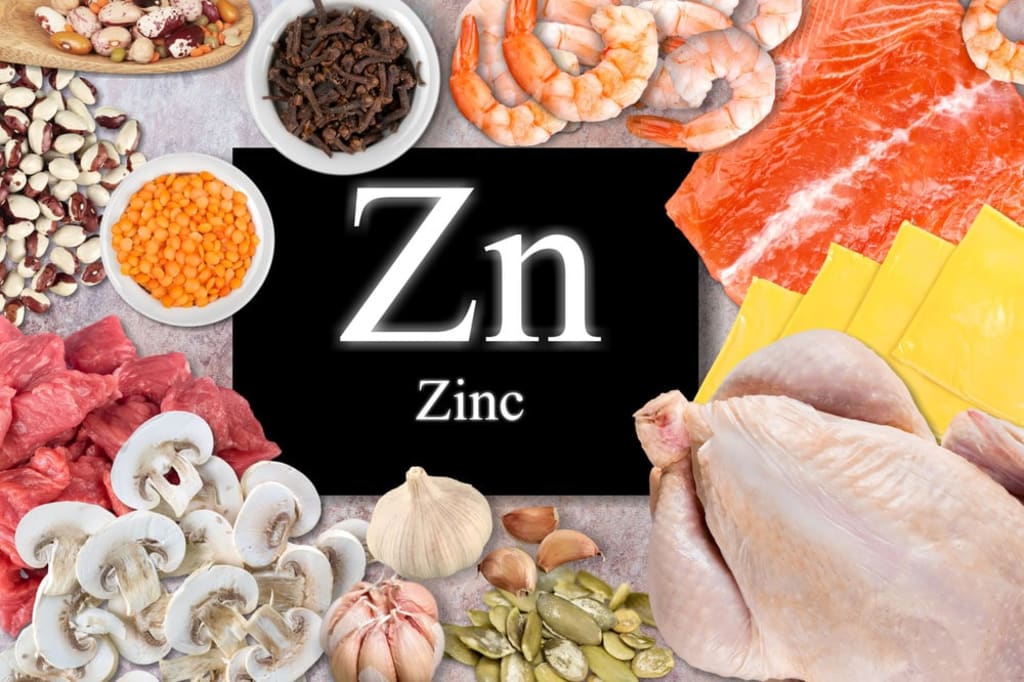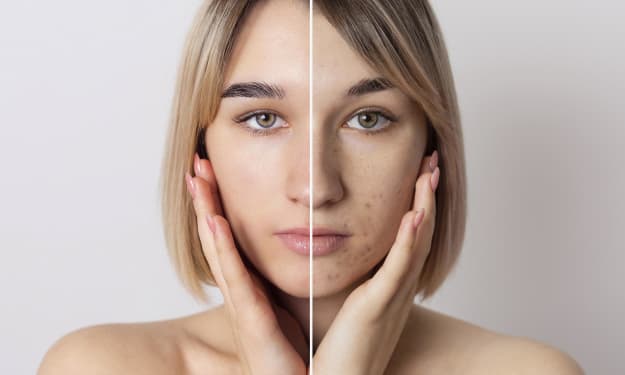Did You Know That Zinc Is The Balancing Mineral?
Health

Hundreds of enzymes need zinc, including those that govern vision, hearing, skin, hair, nails, connective tissue, sexual function, digestion, immunological response, and more. Zinc is necessary for numerous critical enzymes in RNA and DNA synthesis, such as RNA transferase, and is also involved in protein synthesis, which is an important function.
A ZINC DEFICIENCY ON A GLOBAL SCALE
Today, there are a limited number of excellent sources of bioavailable zinc. The majority of the world's soils are zinc deficient. Zinc is seldom replenished adequately in today's soils, which is a severe concern all around the globe. Zinc levels in hybrid crops are much lower. Because modern hybrid crops yield more food per acre, each stalk of wheat, maize, or vegetable has much less zinc than when hybrids were not utilized before.
Zinc is often removed from foods during processing.
When wheat, rice, maize, sugar, and even salt are processed, zinc and other trace metals are eliminated.
Salt. Natural sea salt contains a little amount of zinc. Zinc and other trace elements are, however, eliminated from refined "table salt." This is one of the reasons why table salt is such a low-quality food.
Food that has been frozen. To keep their color, several foods, particularly frozen veggies and perhaps meats, are sprayed with EDTA. This chemical depletes the zinc content of the food by removing some zinc and other minerals. The spraying is done to keep the color of the meal. Zinc deficiency is common in newborns. Because the bodies of today's mothers are deficient in zinc, the kids do not get adequate zinc while in the womb. Zinc levels in vegetarian diets are much lower. The fundamental reason is that meats, particularly red meats, are the only excellent suppliers of zinc in the diet. Zinc is rapidly depleted by stress, literally within seconds. This is part of the body's stress-related fight-or-flight response. Zinc insufficiency is a big concern all over the globe for the reasons stated above.
ZINC RESOURCES
Sources of food Meat and eggs are the primary sources of zinc in the diet. Vegetarians have a hard time getting enough zinc from food! Red meats, such as hamburger meat, are the finest suppliers of zinc. Chicken, turkey, eggs, and various seafood are also high in zinc. Zinc is more abundant in animal products because it aids in the development of the etheric energy field, which is more developed in animals than in plants.
Sources that are vegetarian. Zinc is often not found in vegetables, beans, grains, or fruits. Pumpkin seeds are one of the greatest vegetarian options. Zinc is also found in sea plants like kelp. Today's fruit has relatively little zinc. It's one of the reasons why you shouldn't consume it. Vegetarians have a high zinc deficiency, according to hair testing. Vegetarian diets have lower zinc levels, and the zinc compounds included in vegetarian meals are more difficult to absorb. This is one of the most compelling reasons to consume meat. Supplements for nutrition. The sodium/potassium ratio on a well done hair mineral test helps predict the quantity of zinc required, which is an important part of zinc supplementation. Other ways of determining zinc are less accurate. It's easy to overdose on zinc and throw the body off balance.
ZINC DEFICIENCY SYMPTOMS
Skin. Stretch marks on the skin, white patches on the fingernails, and varicose veins are all examples. Zinc deficiency is common in acne, dermatitis, eczema, psoriasis, boils, vitiligo, and other skin illnesses. Because their period controls zinc and copper levels, young women have greater acne and other skin issues at particular periods of the month. Acne occurs in many situations when copper levels are greater than zinc levels, and acne is an indication of a need for zinc and other minerals.
Yeast problems. Zinc is necessary for immunological function, yet too much copper in the body causes zinc to oppose or antagonize it. Low tissue zinc levels are linked to the development of fungal and yeast conditions throughout the body for these reasons. Difficulties with menstruation and female reproduction. Premenstrual tension, estrogen dominance, and other menstrual abnormalities are all linked to zinc deficiency. Zinc has a great moderating influence on several health issues. Other zinc-related reproductive issues include period cessation in younger women, infertility, irritability, and cramps during menstruation. Birth Defects, Fetus Growth, and Development Both in the womb and after birth, zinc is essential for growth and development. and deficiency is significantly linked to a variety of congenital abnormalities.
When compared to 100 years ago, zinc deficiency is one of the primary causes of a doubling or more of the birth defect rate in most Western countries. Deficiency is virtually always a contributing factor in developmental delays, learning difficulties, autism, and other developmental issues. Zinc is often a part or the sole cause of short height, delayed testicular development, undescended testicles, and other growth disorders.
System of Male Reproduction. Zinc accumulates in the prostate gland more than in any other bodily tissue. Significant amounts of zinc may be found in seminal fluid or sperm. Zinc insufficiency is a contributing factor in the majority of male reproductive and prostate disorders. Prostatitis, an enlarged prostate, prostate cancer, and other metabolic diseases linked to male infertility are examples of these conditions. Erectile dysfunction and various male hormone imbalances, such as low testosterone, as well as perhaps other hormone-related problems in males, are among them.
Vision. Most eyesight disorders are caused by a zinc deficiency. Among them include macular degeneration, retinitis pigmentosa, night blindness, iritis, and various diseases. Along with the male prostate gland and the intestines, the retina of the eye is one of the richest tissues in zinc in the human body and one of the most zinc-dependent tissues.
The Mind. In and of itself, zinc is regarded to be a relaxing neurotransmitter. Hyperactivity, ADD and ADHD, anxiety, irritability, nervousness, emotional instability, mood swings, bipolar illness, and a variety of other mental and emotional disorders are all signs of zinc deficiency. Zinc deficiency is a common cause of conditions including epilepsy, convulsions, schizophrenia, and other serious mental disorders. Because of its influence on the central nervous system, zinc is referred to as a "sedative mineral." It's also necessary for improved mental performance and the neo-(new cortex's brain's) mental growth. Zinc is therefore an important mineral for mental and spiritual growth in nutritional balancing science.
The Immune System. Because immunity affects all physiological systems, it's more appropriate to term it the 'immune response' rather than the 'immune system.' Zinc is necessary for both humans and animals to operate properly in this region. It is beneficial in the prevention of all infections as well as the treatment of skin infections and other illnesses. Zinc is often prescribed for colds, flu, and a variety of other acute diseases since it is typically beneficial. In the immunological response, it functions in tandem with copper.
The digestive system is the organ that breaks down food. Zinc is necessary for the formation of all digestive enzymes. It's also needed to repair fast-growing intestinal tissue, as well as to make bile, liver, and pancreatic secretions. Low zinc levels are linked to ulcers, irritable bowel syndrome, yeast infections, colitis, and a variety of other digestive issues. System of the heart and blood vessels. Zinc is needed to keep the arteries and veins flexible. Hardening of the arteries, high blood pressure, aneurysms, strokes, heart attacks, and other cardiovascular issues are all common deficiency signs.
Surgical procedures and wound healing Zinc supplementation prior to surgery may assist to reduce problems such as infections and adhesions. It's also necessary for wound healing, so it might help speed up the process and avoid scarring. Zinc is required for the formation of all connective tissue. Problems with tendons and ligaments, such as tendonitis, bursitis, and, in particular, inflammatory signs, are indicators of imbalance or deficiency. Zinc is an anti-inflammatory mineral that helps the body balance copper and other pro-inflammatory chemicals.
DIAGNOSING A ZINC DEFICIENCY
Blood. Zinc does not accumulate in the blood serum, hence serum blood tests aren't very accurate. White blood cell zinc levels are used by a few holistic practitioners to determine total body zinc. This gives some information, however it is not very trustworthy. Urine and feces are two types of waste. These techniques of determining zinc levels are not regarded accurate since they rely too much on the previous day's meals, as well as other variables such as dietary zinc absorption. Zinc Deficiency Affects Almost Everyone. As a result, rather than determining whether or whether a person is deficient, the issue becomes how much zinc supplementation is required.
ZINC AND HAIR MINERAL ANALYSIS
The amount of zinc in human or animal hair is determined by a variety of variables. It's a crucial mineral to check for in the hair. However, it may not always represent the entire zinc burden in the body. Furthermore, our Hair Testing results reveal that the zinc content in a person's hair cannot be utilized to estimate how much extra zinc they need. The sodium/potassium ratio on a correctly completed hair mineral analysis, according to Dr. Paul Eck (Analytical Research Labs), is the best technique to identify the requirement for zinc. In other cases, he also suggested adding more zinc. The perfect zinc level for hair. Even if the zinc content in your hair is normal, you should still take a zinc supplement. When the body tries to protect or adjust for a low sodium level or a low sodium/potassium ratio, it might result in low hair zinc. Zinc levels in the hair have increased.
The presence of hazardous metals, generally copper, may cause a hair zinc level larger than roughly 16 mg percent. Zinc may be used by the body to defend it against the ravages of other harmful metals. Zinc poisoning is uncommon, although it may arise as a result of occupational or other exposures. Only zinc miners and those who are exposed to substantial volumes of zinc ore and zinc dust develop this condition. Simply said, there isn't enough zinc in the soil, food, air, water, or other common areas to cause an overabundance.
OTHER NUTRIENT RELATIONSHIPS
The sedative minerals include calcium, magnesium, and zinc. Sedatives include zinc, calcium, and magnesium since they all aid to reduce excessive sympathetic nervous system activity. They're all designed to reduce excessive brain activity. Zinc, in fact, is thought to be a relaxing neurotransmitter by some experts. Zinc tends to reduce salt levels in the hair. This is part of the body's complicated mineral system, in which each mineral has its own unique effect on the levels of other minerals. Serum levels are not affected since they are controlled differently than tissue levels of most minerals. Depending on the scenario, zinc may either boost or diminish hair calcium. It effectively lowers calcium in slow oxidizers by assisting in the restoration of adrenal function. Excessive zinc, on the other hand, may cause hair calcium to rise by reducing salt levels too low. Zinc has a parasympathetic impact in quick oxidizers, which may assist increase low tissue calcium and balance high sodium and potassium levels. As a result, zinc tends to control calcium levels in hair tissue, much as it does potassium levels.
In slow oxidizers, zinc elevates potassium, whereas in quick oxidizers, it tends to reduce it. When the potassium level in the hair is low, zinc is significantly more efficient than potassium in raising it. Zinc slows the rate of oxidation in quick oxidizers. As a result, in a quick oxidizer, it tends to lower the sodium and potassium levels in the hair. In this aspect, zinc acts as an adaptogen, which means it helps to normalize calcium levels that are either too high or too low.
About the Creator
Rahau Mihai
Hi! Come to my profile and you will see really useful things or something to relax you !






Comments
There are no comments for this story
Be the first to respond and start the conversation.